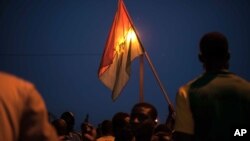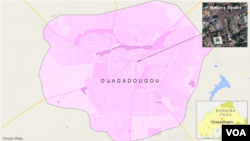In Burkina Faso, army troops entered the capital city overnight without resistance. They are asking presidential guard members who carried out last week's coup to lay down their weapons. Coup leader General Gilbert Diendéré said he is optimistic about the outcome of discussions.
People were out and about Tuesday in Ouagadougou, with only a few army trucks seen driving through the streets.
Army troops entered the city overnight, but most stayed inside military camps, as military chiefs talk with coup leader Gilbert Diendéré.
Speaking at a news conference, the general denied the army had given him an ultimatum and said he wants to avoid confrontation.
He said the presidential guards, also known as RSP, do not want to fight. He said that they will defend themselves if they have to, but they do not want to shed blood to stay in power. He insisted it is useless to commit massacres against a country they still want to serve.
The RSP seized power in a coup last Wednesday. They said the transition government was not organizing free and fair elections. Diendéré asked for all candidates to be allowed to run, including former members of Blaise Compaoré's government.
Compaoré was president of Burkina Faso for 27 years before being ousted last year, following massive protests over his plan to change the constitution so he could seek another term.
After several days of crisis, West African mediators announced a proposed peace deal Sunday. In exchange for giving back power to the transitional government, and releasing Prime Minister Isaac Zida, Diendéré and the RSP solders would receive amnesty.
On Monday, soon after the news broke of the army stepping in, Diendéré agreed to the conditions of the peace deal. The prime minister reportedly has been released.
But anti-coup protesters disagreed with the proposed amnesty. The peace deal is due to be addressed Tuesday at an ECOWAS summit in Nigeria.
Diendéré said that whatever West African countries determine is the best course, he will take it into account, and he will enforce whatever the heads of state will decide at the ECOWAS meeting.
At least 10 people have been killed and more than 100 have been injured since the onset of this crisis.
West African negotiators announced a plan Sunday to restore civilian authority but offer amnesty to the coup leaders. Under the plan, the elections originally set for October 11 would be held sometime before November 22.
Monday, a U.N. spokesman said Secretary-General Ban Ki-moon is following the situation with great concern, and calls on both the military and presidential guard to exercise restraint and avoid violence.






